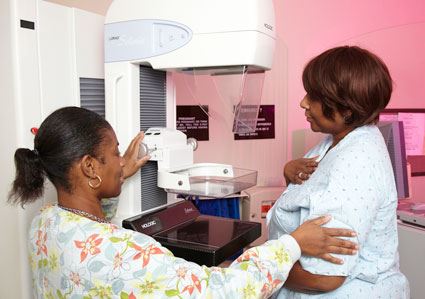Cancer Screenings
Early Detection Saves Lives
From screening through diagnosis to treatment and survivorship, RWJBarnabas Health and Rutgers Cancer Institute provides exceptional expertise and knowledge in all types of cancer. As New Jersey’s only National Cancer Institute-designated Comprehensive Cancer Center we offer the most advanced diagnostic modalities and treatment options.
 Many cancers can be detected early through regular screenings. Early detection
of any cancer improves outcomes. It is important to speak to your health
care provider about the appropriate screenings and schedule for you. Most
screenings are covered by insurance.
Many cancers can be detected early through regular screenings. Early detection
of any cancer improves outcomes. It is important to speak to your health
care provider about the appropriate screenings and schedule for you. Most
screenings are covered by insurance.
Please note: your family medical history or your personal health issues can modify these screening guidelines. Talk with your health care provider about the best screening plan for you.
-
Breast Cancer Screenings
![]()
- Women age 40 to 54 should get a mammogram every year.
- Women 55 and older should speak to their doctor about switching to mammograms every two years.
- Screening should continue as long as a woman is in good health and is expected to live 10 more years or longer.
- Women are encouraged to know how their breasts normally feel and report any breast changes promptly to their health care providers.
Schedule a Mammogram.
-
Colorectal Cancer Screenings
![]()
-
Beginning at age 45, people of average risk for colorectal cancer should
follow one of these six testing schedules as recommended by your health
care provider:
- Yearly guaiac-based fecal occult blood test (gFOBT)*
- Yearly fecal immunochemical test (FIT)*
- Multi-target stool DNA test every three years*
- Flexible sigmoidoscopy every five years*
-
Colonoscopy every 10 years
* If the test is positive, a colonoscopy should be done.
- If you are at high risk of colon cancer based on family history or other factors, you may need to be screened using a different schedule. Talk with your health care provider about your history and the testing plan that’s best for you.
- A person in good health should continue regular screening through age 75.
- For people ages 76-85, talk with your health care provider about whether continuing to get screened is right for you.
Make an appointment with one of our health care providers to talk about what colon cancer screening is right for you.
-
Lung Cancer Screenings
![]()
-
Adults aged 50 to 80 years who have a 20 pack-year smoking history and
currently smoke or have quit within the past 15 years should be screened
for lung cancer with low-dose computed tomography (CT) every year.
- A pack-year is a way of calculating how much a person has smoked in their lifetime. One pack-year is the equivalent of smoking an average of 20 cigarettes—1 pack—per day for a year.
- Screening should stop once a person has not smoked for 15 years or has a health problem that limits life expectancy or the ability to have lung surgery.
-
Before getting screened, you should talk to your health care provider about:
- Your risk for lung cancer
- How you can quit smoking, if you still smoke
- The possible benefits, limits, and harms of lung cancer screening
Learn more about our Lung Cancer Screening Programs
-
Prostate Cancer Screenings
![]()
- A Prostate-Specific Antigen (PSA) screening test can be utilized for patients who may be at risk of prostate cancer. However, men at average risk should speak to their health care provider to discuss the pros and cons of prostate cancer screening starting at age 45.
- If you are African American or have a father or brother who had prostate cancer before age 65, you should talk to your health care provider about screening beginning at age 40.
- If you decide to be tested, you should have the PSA test with or without a digital rectal exam. How often you are tested will depend on your PSA level.
Make an appointment with one of our health care providers to talk about what prostate cancer screening is right for you.
-
Cervical Cancer Screenings
![]()
- Cervical cancer screening should begin at age 25.
- Women aged 25 to 65 should have a primary HPV test every five years. If primary HPV testing is not available, women should have a Pap test and an HPV test every five years (this is preferred) or have the Pap test alone every three years.
- Those over age 65 who have had regular screening in the past 10 years with normal results and no history of CIN2 or more serious diagnosis within the past 25 years should stop cervical cancer screening. Once stopped, it should not be started again.
- Women who have had a total hysterectomy (removal of the uterus and cervix) should stop screening (such as Pap tests and HPV tests), unless the hysterectomy was done as a treatment for cervical cancer or serious pre-cancer. People who have had a hysterectomy without removal of the cervix (called a supra-cervical hysterectomy) should continue cervical cancer screening according to the guidelines above.
- People who have been vaccinated against HPV should still follow these guidelines for their age groups.
Make an appointment with one of our health care providers to talk about what cervical cancer screening is right for you.
To schedule an appointment with one of our cancer specialists please call 844-CANCERNJ or 844-226-2376.



